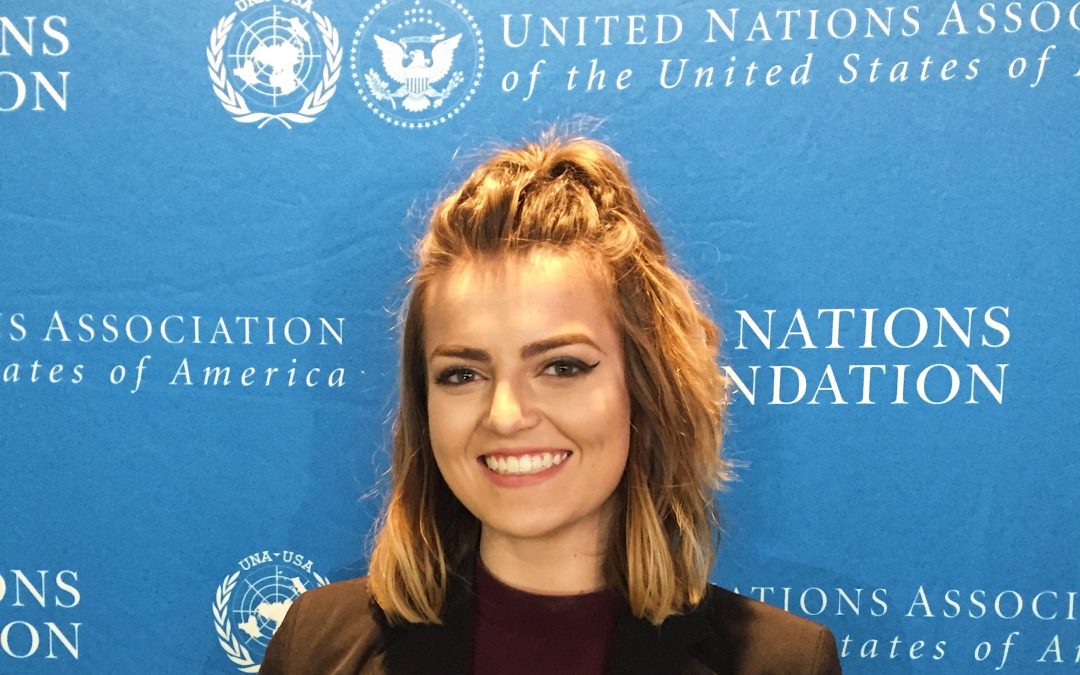
by Madison McHugh | Apr 26, 2019 | Internship Experiences, Undergraduate Students

Pictured: GrowNYC’s green market in Union Square.
My name is Kyla Stewart, and I am a senior at Seton Hall University majoring in Diplomacy with a minor in Spanish. I worked as the Government Relations Intern at GrowNYC, a not-for-profit organization that focuses on sustainability and food access.
GrowNYC’s programming includes green markets and community gardens as well as school-based initiatives that emphasize school gardens, self-sustaining cafeterias, zero waste, and youth employment for our markets, promoting environmental awareness at a young age. There are over 100 gardens and 50 green markets across the five NYC boroughs. I developed a huge passion for the organization’s mission, and I thoroughly enjoyed every day spent working in the office and out in the field.
I completed a variety of tasks under the development department but drafting and editing contracts were the priority. My work involved processing and writing contract agreements for GrowNYC funding while also seeking out new grants and reporting on progress for each contract. I never thought that processing a 200+ page city council discretionary funding allocation contract could be fun, but I enjoyed it tremendously, and I have gained so much insight as to how non-profits function and fund programs.
I was also regularly involved with the non-profit lobbying arm of the group, which included writing and prepping materials for presentations intent on helping GrowNYC gain more funding for its programming. In this role, I was able to be highly independent and gain plenty of hands-on experience in the field of government relations, and I am so grateful for the opportunities offered by the non-profit and its impactful initiatives.
GrowNYC was more than I ever could have hoped for. The work environment fostered so much of my professional growth, and I gained an incredible amount of knowledge and experience as a result. This internship cemented my interest in the government relations field with a non-profit focus, and I hope to someday get my master’s in diplomacy in the field of sustainable development. GrowNYC’s mission left a huge personal impact on me, and I go forward confident that I have gained the skills I need to be successful.
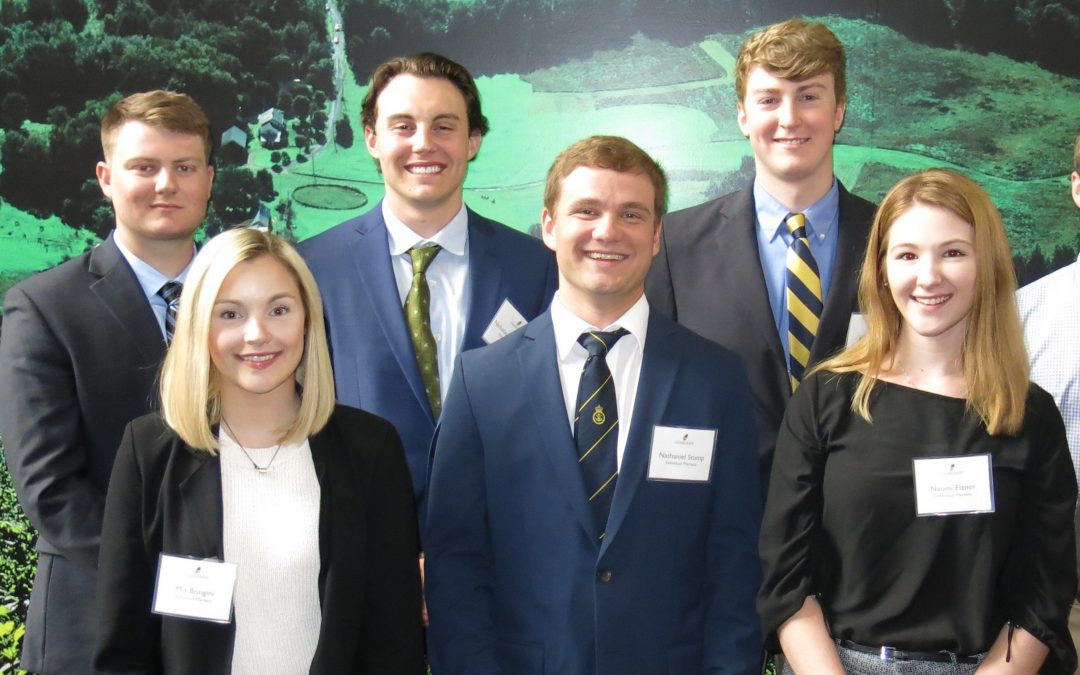
by Madison McHugh | Mar 22, 2019 | Internship Experiences, Undergraduate Students
My name is Austin O’Neill, and I am a senior double-majoring in International Relations and Economics with a minor in Arabic. I completed an internship at Guardian Life Insurance Company of America this semester in addition to my previous full-time internship last summer. My position is in Disability Insurance individual markets under the Product Strategy team.
I originally chose to intern at Guardian Life because they have a large presence in my hometown of Pittsfield, MA, offering a great opportunity very close to home over the summer. I continued to intern with Guardian Life when the Product Strategy team asked me to stay on during the school year to assist with a variety of projects, which indicated that I am considered a valued member of the team.
The department focuses on many different areas of disability insurance products, including research and development, competitive research, product training, filing, and support. I had the chance to assist across every responsibility, providing me with a broad spectrum of learning opportunities. My main responsibilities were preparing files for state insurance agencies, altering documents and content with the rebranding team, and creating PowerPoints and spreadsheets for presentations by the executive team.
One interesting project I completed was designing the PowerPoint for a new product pitch presented by the executive team. The product was considered revolutionary for the market, and I was tasked to express the characteristics of the product. This project was exciting as it had real implications for the highest-ranking officers of Disability, and it allowed me to showcase skills I have learned at the internship and through classes at Seton Hall.
I found a great balance in building skills between my internship and course studies. I became very familiar with Excel, which is a skill I have utilized at school with assignments such as my senior thesis, as well as data collection for the Product Strategy team. While working on product filing assignments for Guardian Life, I received exposure to Adobe Pro, which is important for many different business operations, but was also applicable as a document editing tool for my studies. Additionally, it was interesting to work on the front-end and back-end of rebranding for a large company. I edited and updated documents, and I tested webpages and programming software for consumer friendliness. The skills I learned from these duties are numerous and will help me in my future career.
My internship at Guardian Life helped me develop in both my professional and academic life. I networked across all business areas and may seek full-time opportunities at Guardian Life after graduation. Even as a Fortune 250 company, Guardian Life still seeks to receive input from all its employees, from interns to executive teams. For these reasons, I would suggest others to seek internships at Guardian Life for learning and development in the private sector.
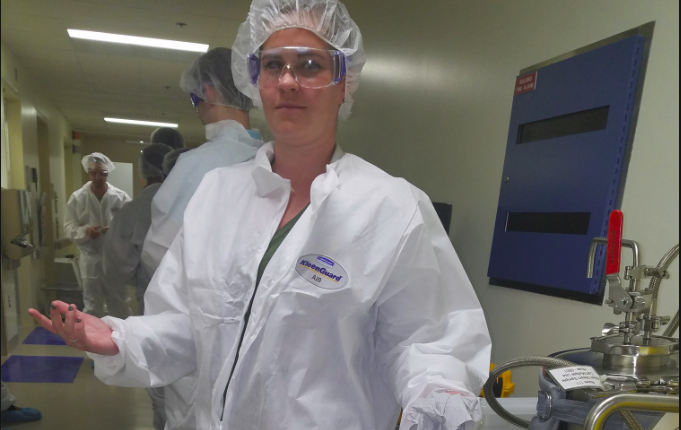
by Madison McHugh | Dec 5, 2018 | Graduate Students, Internship Experiences
My name is Amy Marks, and I am pursing a dual degree in the MBA/MA program with a specialization in Supply Chain Management. I was a Data Scientist Intern at Pfizer primarily responsible for improving the Supply Chain of pharmaceuticals through predictive analytics and machine learning algorithm improvement. During my time with Pfizer, I worked on a specific project in text mining through Latent Dirichlet Allocation and Natural Language Processing – in other words, I built models based on data in text format rather than numeric. In addition, I was responsible for building an interactive dashboard so that departments could interact with my findings independently based on their needs. My work allowed my team to quickly identify trends, patterns and areas in need of improvement and then communicate the results to the respective departments.
My internship directly supported my goal of improving access to medicine and vaccines in developing countries. Among its many global initiatives, Pfizer has a pledge to the Developing World under the Advance Market Commitment. Under the Gavi Vaccine Alliance, Pfizer has pledged to supply up to 740 million vaccinations to infants and young children in Gavi-eligible countries through 2025. This is only possible through sound supply chains, which are improved through data analytics.
My coursework equipped me with the basic skills and knowledge, but application in the real-life professional world can be challenging. Pfizer is an extremely fast paced, forward-thinking company; to keep up with everything going on around me was a big difficulty. However, I met the challenge by completing diligent research on topics before meetings, learning the big picture of specific projects, and, most importantly, identifying and improving on my personal strengths that could propel the company forward.
The most rewarding part of my internship was gaining exposure to a variety of business operations. I had the opportunity to tour research, manufacturing and quality assurance labs throughout the company’s various locations. I attended weekly learning sessions that provided information on the ongoing projects outside my field of study. I also attended multiple events that provided a variety of networking opportunities, including volunteering at a local park, meeting after-hours for team bonding, and attending various workshops. Furthermore, I was included on daily conference calls and meetings, which were extremely beneficial in experiencing how global operations are managed in a business setting.
My biggest takeaway from this experience was the importance of getting involved, taking initiative, and identifying the strengths that you can offer. It is much easier to remain in your comfort zone or to quickly be overwhelmed by the jobs’ expectations, or by all of the activity going on around you. However, every person working on a project contributes in one way or another, and it is imperative to be self-aware of what you have to offer, what you can learn and how you can apply it. This allows you to not only gain skills, but to increase your own confidence, network with professionals, and highlight your value as a potential future employee.
I recommend this internship for students interested in business as well as the unique position of pharmaceuticals to improve the world through the direct production and development of sustainable medicines and vaccinations. It was a truly unique experience.
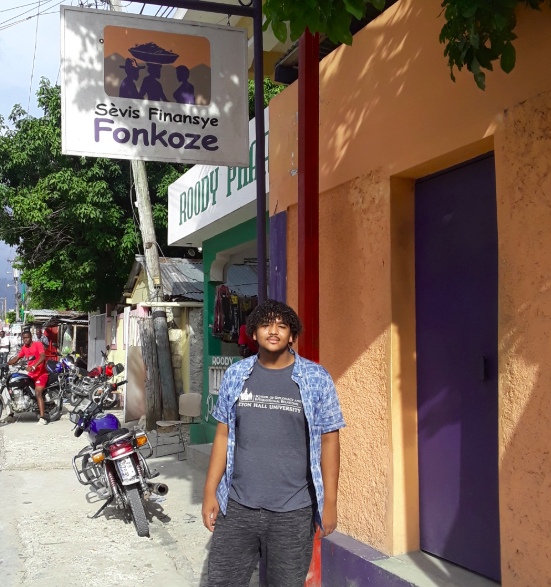
by Madison McHugh | Nov 9, 2018 | Internship Experiences, Undergraduate Students
My name is Kenneth Saint Preux, and I am a junior in the Diplomacy and International Relations program at Seton Hall. Over the summer, I interned in Mirebalais, Haiti for an organization called Fonkoze, an NGO that works to alleviate poverty in Haiti. I interned in their CLM (Chemen Lavi Miyò) program. Chemen Lavi Miyò means “Pathway to a Better Life”. This phrase embodies the program’s goals. CLM’s goal is provide services and empowerment to low-income women across the central plateau region of Haiti. My responsibilities included accompanying case managers to various sites to research and assist on project implementation while managing participants.
Working with an NGO in a developing state gave me access to knowledge that most people would not be able to obtain. Fonkoze gave me an opportunity to better understand the issues that are plaguing Haiti. By understanding these various issues, I am also learning more about the foreign policy of Haiti. Haiti lacks many resources and depends on aid from the U.S. and trade with the Dominican Republic. The Haitian Government’s reliance on aid and trade allows for the poverty issue in Haiti to be exacerbated to the point where it is almost impossible to find “the poorest of the poor” in Haiti.
My coursework has helped during this internship as many of the challenges I encountered came from the cultural differences between the staff and participants. My Cross-Cultural Negotiation and Conflict Management course helped significantly with my communication skills. As I have learned throughout my studies, interacting with those of other cultures is a key component to the art of diplomacy and becoming a practitioner in the field. Another class that helped me with my internship was my Institutions of Global Governance class, teaching me about the functionality of NGOs across various developed and developing nation-states. NGOs play a significant role in Haiti, as they provide services that the Government of Haiti cannot provide. Fonkoze is such an example. The last course I will mention that helped in this internship was my Sustainable Development class, which taught me how nation-states could grow and prosper while also stressing the intersectionality of poverty and economic development. Poverty is not an issue that just simply disappears over time or periods of growth; solutions require massive amounts of effort and research. This connects to my current work, as Fonkoze focuses its efforts on female-headed households, due to their usually being the most fragile of these families under “extreme poverty”.
I would recommend Fonkoze to students interested in gaining experience in the development field. Fonkoze is a great organization that will send you to a place that truly needs help. Fonkoze gives students the opportunity to see a successful NGO in a developing state.
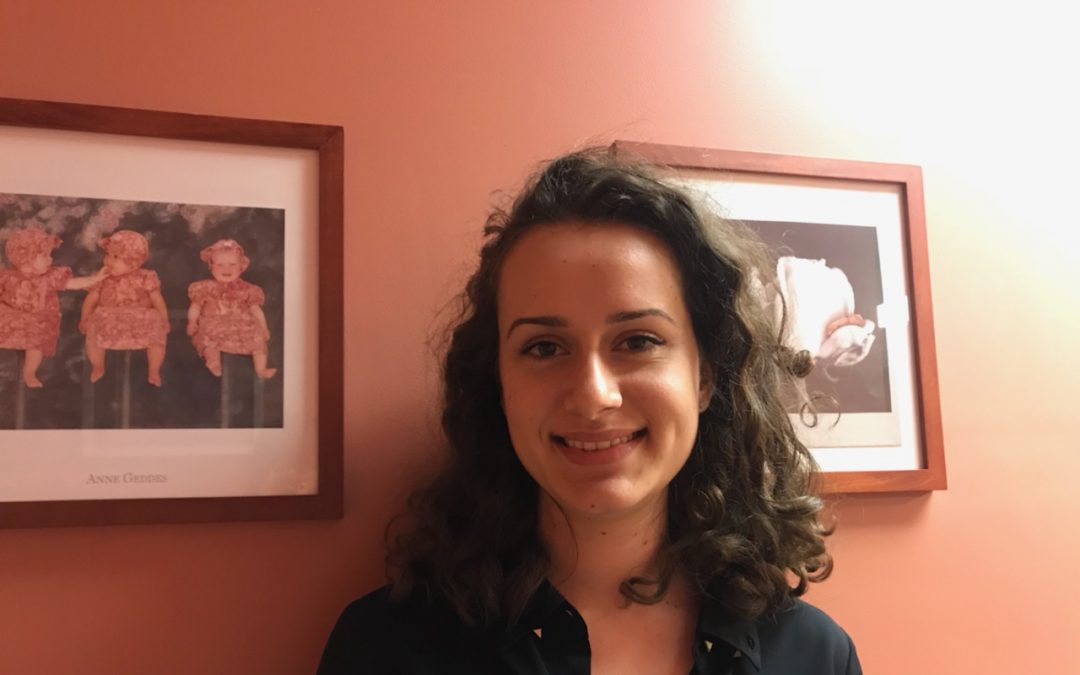
by Madison McHugh | Oct 25, 2018 | Internship Experiences, Undergraduate Students
My name is Zofia Gallegos, and I am a senior Diplomacy & International Relations and Spanish double major. In Spring 2018, I was the Economic Empowerment Intern at the International Rescue Committee (IRC) in Elizabeth, NJ. Coming from a family of immigrants, I was always interested in immigration issues and laws governing immigration to the United States. I knew I would be a good fit for an organization like the IRC, which is dedicated to helping people that have just moved to the country to establish themselves and build their lives in the U.S.
While interning at the IRC, I met many different people from diverse backgrounds. Our clients ranged from middle-aged parents looking to provide a better life for their families, to teenagers and small children who moved to the U.S. and look for guidance towards understanding and becoming accustomed to American culture.
Day to day, my work varied greatly, but I always completed case notes regarding our clients and their developments into ETO software. My fellow interns and I also assisted with career development services or job searches on behalf of our clients. Career development might include learning about a client’s education, skills, and past work experience to determine what type of job he or she would be a good match for. Oftentimes, we helped clients obtain more information about a particular career path that they were pursuing, or we informed them of available job opportunities in the area. We utilized job search engines to look for jobs that would fit their salary needs and qualifications. In addition, I participated in team meetings to discuss the current issues, advancements, and concerns in our department. At these meetings, we discussed what we had accomplished over the week, what our challenges were, and something that we had successfully achieved.
My biggest challenges interning at the IRC were language and cultural barriers. Language barriers are self-explanatory; many times, our clients had recently arrived to the U.S. and had only begun the process of learning the English language. Other clients who came from the Middle East or the Caribbean region also required more attention since I only understand English, Spanish and Polish. Interpreters were typically available to translate, but I would make the attempt as well. Ultimately, I was able to turn my challenges into strengths by engaging with IRC clients in an open and friendly manner and having the patience to understand and communicate. I am happy to have had the opportunity to work with the IRC, and their goals to aid those entering America as immigrants are very much aligned with my long-term goals to help those in similar circumstances. I would recommend an internship with the IRC as you meet a host of incredible people, and the role allows you to learn essential skills in communication.
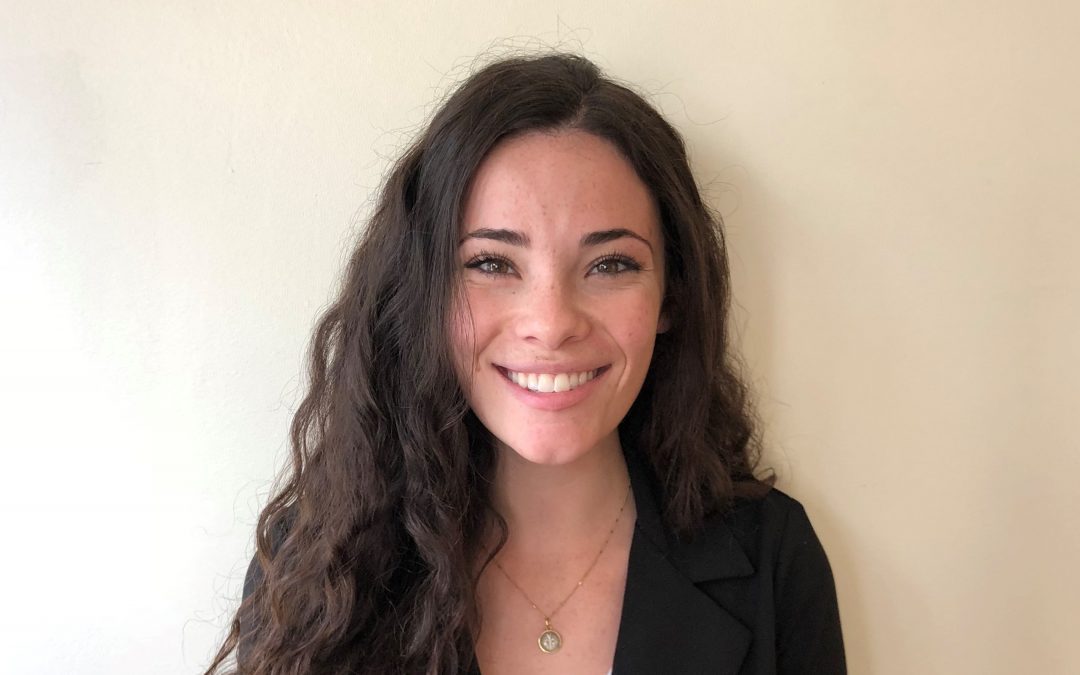
by Madison McHugh | Oct 11, 2018 | Internship Experiences, Undergraduate Students
My name is Carlee Sutera, and I am a Senior Diplomacy and International Relations student at Seton Hall University. Over the summer, I interned at the Women’s Entrepreneurship Day Organization (WEDO) in New York City. WEDO is a nonprofit organization whose mission is to educate, empower, celebrate, and support women in business and inspire girls to be leaders in STEAM (Science, Technology, Engineering, Arts, and Math) so they can create a positive impact in their communities worldwide. I was the International Relations Intern responsible for communicating and coordinating with WEDO global ambassadors for the official celebration of Women’s Entrepreneurship Day on November 19th. Since the event is celebrated in 144 countries, there is a lot to be done year-round, and I was given the opportunity to work intimately with ambassadors from the United States, Europe, Africa and the Middle East.
My Diplomacy classes prepared me to interact with people of all different cultures and enhanced my communications and negotiating skills, all of which were essential to my position. The skills gained at my internship have been crucial to my professional development as well, specifically my experience with new communications tools such as WordPress, Canva, and SendGrid. I also had the opportunity to improve my interpersonal skills and networking abilities. When working with many different people on many different, coordinated tasks, there are bound to be communication issues, but I learned to navigate the process and be productive even in high-stress situations.
Some of my favorite assignments included event planning for WEDO-sponsored events, such as our monthly breakfasts with women entrepreneurs discussing their experiences. This was some of the most rewarding work because I was able to see and experience the physical results. Early on, we featured Adi Eckhouse, the creator of the iPhone’s facial recognition technology (called RealFace), from Israel. At another breakfast, we featured Reshma Saujani and Fereshteh Forough, two women pioneers in the coding field with non-profit organizations that encourage closing the gender gap in technology spaces. Listening to women talk about their experiences as entrepreneurs was truly inspiring and further emphasized the importance of what WEDO as an organization is doing. While I have been extremely lucky and privileged with many opportunities in my life, many women around the world do not have the same access. WEDO gives women opportunities that they would not have otherwise, making a real impact on individual lives. Because of this experience, I hope to use my skills to further uplift and support women in my line of professional work. I would recommend this internship to anyone interested in gaining experience with a large and impactful non-profit that also has a significant impact on the lives of women all over the world.
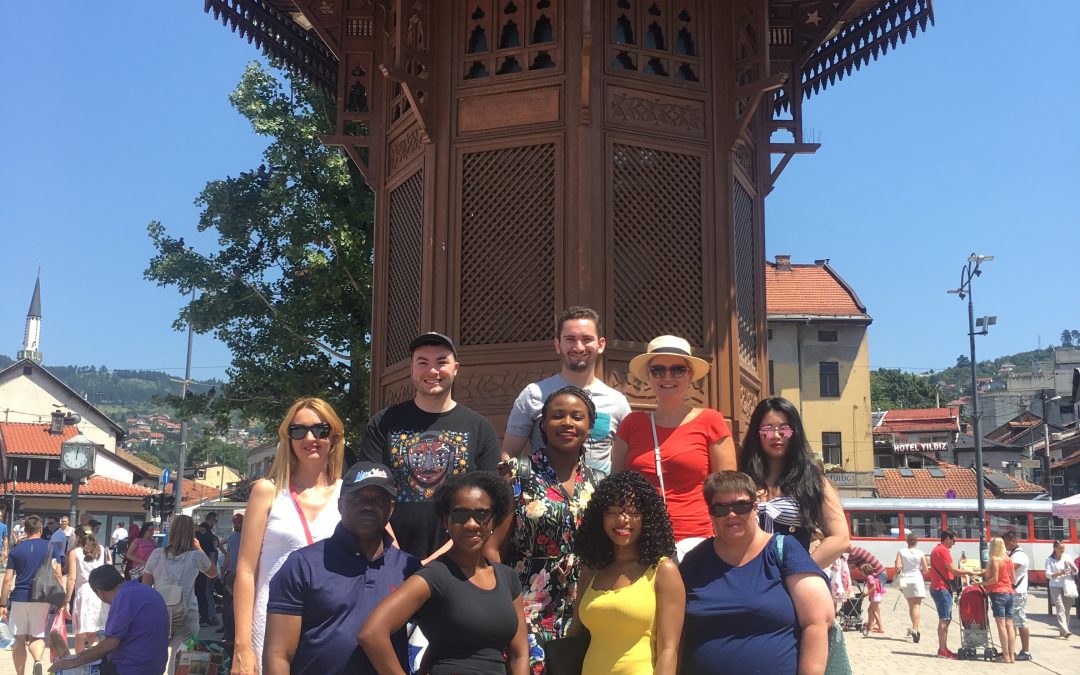
by Catherine Ruby | Sep 24, 2018 | Uncategorized
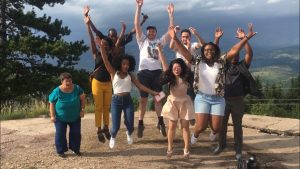
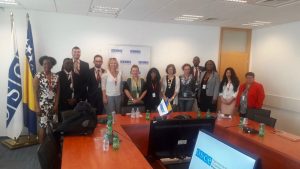 Author: Senhwa Horng, M.A. Candidate
Author: Senhwa Horng, M.A. Candidate
Sarajevo is a beautiful place. Beneath the rolling green hills, peppered with the red roof houses, stands the eclectic architecture of the storied and multi-cultured city. The old town sits quietly in the valley with its coppersmiths’ shops, cafes and ice cream stands, welcoming tourists with a quintessential languid, European charm. I visited Bosnia and Herzegovina in July, 2018 as part of a School of Diplomacy study seminar program led by Dr. Borislava Manojlovic to learn about peace and reconciliation in a post conflict nation.
During my short time there, I witnessed the beauty the country had to offer as well as the legacy of war that it carries on its shoulder. The people there are kind, gracious and generous in their hospitality. Yet, underneath the mask of tranquility, lies division. The war that tore the country apart in the 90’s left behind a bitterness and animosity that continues to hang over the three ethnic groups that make up the country’s population — they aren’t one Bosnian people, they are three distinct groups, the Bosniaks, the Serbs and the Croats. Time does not seem to have brought much healing.
Before our delegation departed the U.S., I was asked, “What interests you about Bosnia and Herzegovina? What do you hope to gain from your trip?” At the time, I couldn’t articulate well that what I wanted to see were the people who had lived through the realities of the war, the people for whom the terrors were neither fairytales nor simply the history of some distant land. In my sheltered and privileged life, I couldn’t understand war as more than an abstract concept. I wanted to learn about the Bosnian people’s experience and resilience. As I walked the streets alongside the locals who welcomed me into their shops and restaurants, I suddenly realized that the fields of international relations and conflict resolution are about people. As scholars, we cannot disassociate ourselves from the fields’ humanistic function of creating a safer world for people by understanding and preventing conflict.
As I reflect on my experience, there are three lessons that I know I will take with me, sometimes human nature collides with peace, hope and despair intertwine and peace belongs to those who fight for it.
Sometimes Human Nature Collides with Peace
Velma carried herself with the confident demeanor of a boss lady and her answers to our questions easily carried on into blusterous rants. She had a fierce passion, and from the moment I met her, I knew I liked her. My kind of girl, I thought. She knew what she stood for and she knew what she wanted to do, and she had a cause she was determined to fight for against all odds. The odds, it would seem, are stacked against her, and her fight proves to be a difficult one.
Velma is the founder and President of the Post-Conflict Research Center, an NGO that works to document stories of people during the war, stories such as those about heroic actions taken by ordinary people, stories about small actions that made a big difference.
“I also think storytelling is a powerful and intimate tool to help all sides see a conflict from the perspective of their enemies,” I said to her. In my naivety, there was a small part of me that thought, perhaps, the key to peace and reconciliation was right in front of me.
“It can be,” she replied, “Unfortunately, it’s not so easy to get people to listen to the stories of their enemies.” Velma explained, “We once tried to do a project that linked the stories of all three sides, side by side, and people were outraged. ‘You can’t tell the story of the Muslims, next to the story of the Serbs!’ they said.”
I thought to myself, Strange isn’t it? The opportunity to heal is right in front of them, and still there are people who would speak out against it. What could be more important than peace? What values are there in the world, so worth protecting, that would make a person choose to continue to hate their neighbor, over the opportunity to reconcile? It’s a stark contrast to see that in this world there are people like Velma who would fight for peace, and stand against division, and then there are people who would stand against peace, no matter the cost and no matter the reason. That’s what makes peace so complex, humans and all the multitudes of values, ideals, judgments and reasoning, both logical and illogical that come with being human.
Hope and Despair Intertwine
The Tunnel of Hope was a dangerous underground trek constructed during the Siege of Sarajevo in June of 1993. In the midst of war the tunnel was built by the Bosniak Army to create a passage through the Sarajevo Airport that would allow food, humanitarian aid, war supplies and weapons to be transferred into the city.
Today, this same tunnel, now called the Memorial Complex Tunnel D-B, is a museum, partially a tourist attraction, partially an educational resource. Our tour guide was a young woman who couldn’t have been much older than I am, but she had lived through the war, and through her stories and explanations an unfamiliar landscape came to life before my eyes. I could almost feel what it was like to spend a childhood in the backdrop of war.
“We didn’t have real eggs to eat during the war,” she said, “and my brother, who’s younger than me, he had never seen a banana until after the war ended. The first time he tried a banana he ate it with the skin still on.”
It seemed like a small detail beside the stories of violence that I had heard during in my time in the country, and yet the imagery of that seemingly trifling anecdote stuck in my mind, because to me, it was a picture of real life in a time of war.
Peace Belongs to Those Who Fight For It
The Genesis Project, an NGO working towards peace and unity in Bosnia and Herzegovina, shared the story of a school in a small town called Jajce. The regional government had made a decision to further divide the community along the ethnic lines that plagued it. The Bosniak and Croat students were separated into two different school buildings. But the children rose up and fought against the segregation. After a year of protest, their efforts were met with victory.
It was in that story that I learned that peace belongs to those who fight for it, and that the hope for peace can be found in unlikely places, in small towns and school children, and even in ourselves. Perhaps the responsibility of finding hope for peace, in places where it seems impossible, belongs to us all.
Senhwa Horng is a second year Graduate student from New Jersey, specializing in International Law and Human Rights as well as Post-Conflict State Reconstruction.
Save
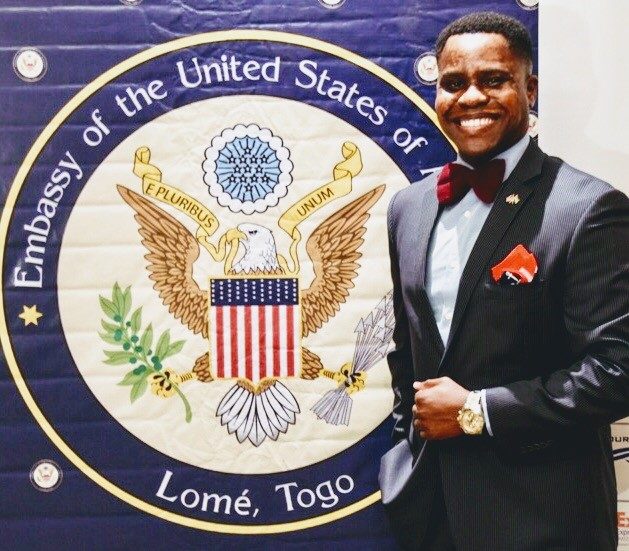
by Madison McHugh | Sep 12, 2018 | Graduate Students, Internship Experiences
My name is Erick Agbleke. While in pursuit of my graduate studies in International Relations and Diplomacy, along with specializations in International Security and Global Negotiation and Conflict Management, I was given the opportunity to intern with the State Department at a US Embassy of my choice. Since I was born in Togo, West Africa, I opted to spend 10 weeks at the Lomé Embassy with the Political and Economic (Pol-Econ) section of the mission. I wanted to return to my country of birth after spending 16 years abroad, to witness and study what kind of effects that U.S. international policies would have on a political climate I am familiar with.
A highlight of my internship with the State Department was a project assigned to me by the Chief of Section (CoS) to strengthen my security background. I wrote and recommended a strategy outline to combat wildlife trafficking in Togo based on the Eliminate Neutralize and Disrupt (END) Wildlife Trafficking Act of 2016. My recommendations, if approved by the State Department’s Office of Economic Growth, Energy and Environment, would be implemented as a policy and included in an annual congressional report. I relied on past project management skills that I developed through my professional career as well as my data collection skills to complete the necessary analysis.
Located south of Burkina Faso and east of Benin, Togo has become a transit state for ivory traffickers smuggling illegal goods. The traffickers take advantage of the porous borders and enter Togo with ivory in its raw form and make their way to Lomé to transform the ivory into art relics transported and sold elsewhere. Lomé is a strategic city for the smugglers because it gives them multitude avenues of exit. It is equipped with an international airport and a seaport serving as the maritime hub for the region, and smugglers utilize these avenues of travel to take ivory into south-east Asia. After my initial analysis of the wildlife trafficking framework in Togo, I was able to address the shortfalls and recommend improvements on how to the government could benefit from a partnership with the U.S.
Interning with the State Department has intensified my desire to become a diplomat and work with other countries to overcome the same challenges we share across the world. In my coursework, I learn and process instances where all areas of international relations are intertwined, amplified by my hands-on experience abroad. I have gained a deeper understanding on how security, diplomacy, conflict resolution and economic development must reconcile with one another to advance towards a common solution. In reflecting on the experience, I would recommend this internship to my fellow colleagues, as it is a great way to gain insight into the wonderful work we do abroad as a country. It is also a great opportunity to apply and test the plethora of theories we learn and discuss in the classroom with our professors.
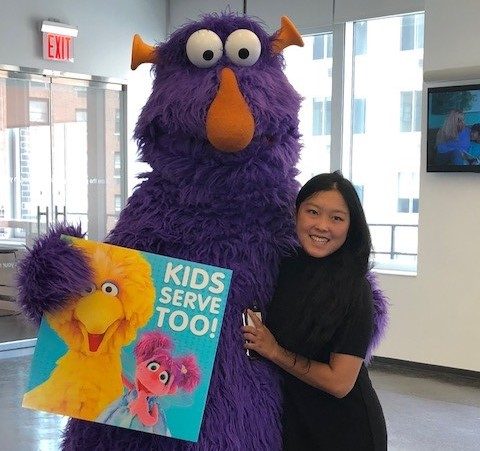
by Madison McHugh | Aug 20, 2018 | Internship Experiences, Undergraduate Students
My name is Kylie, and I am a senior Diplomacy and Modern Language major with a minor in Economics. I interned in Sesame Workshop’s Philanthropic Development Department. Sesame Workshop is the umbrella nonprofit educational organization that produces Sesame Street, which is far more than just the show. The organization works in 150 countries and has initiatives that range from dealing with grief for families of military personnel in the US to performing outreach for those affected by HIV in South Africa. I was drawn to this internship by Sesame’s creative approach to tackling difficult community issues worldwide, and I wanted to pursue my interest in education at a large organization.
My responsibilities included research, filing, inventory, team meetings, and mail management. Although the work wasn’t always glamorous, Sesame interacts with incredible people and entities, from Priscilla Chan to the Canadian government, which allowed me many opportunities to network. I also completed two major projects during my time at Sesame: the first was completing research for Sesame’s 50th anniversary next year, and the second was labeling production documents and plans from the Bangladeshi program’s ninth season production and education initiative. These projects allowed me to embrace the “insider’s view” and appreciate the kind of attention that goes into various initiatives.
Interning at Sesame showed me that nonprofits in education are an exceptional pathway to making a difference, even if it is not as flashy as counterterrorism or cybersecurity. In addition, I realized the intersection of elementary education and diplomacy as Sesame’s programs seek to simplify universal values and international issues to a level that children can internalize. Their goal is not to teach the statistics and policy, but to teach understanding and acceptance. They are instilling habits for children that lead to better lifestyles. It’s not just about learning the alphabet and numbers, but learning about the respect needed to heal divides in the ethnically and religiously diverse streets of Isreal (Rechov Sumsum) or to empower girls in Nigeria (Sesame Square). Many children in countries that Sesame Street airs in obtain their primary education through the show due to conflict, poverty, or the lack of a school system.
My time at Sesame was an amazing experience that taught me the dynamics of how large offices work and the responsibilities of various departments. As an intern, I completed informational interviews with department heads, and my last semester project included researching part of the department to make suggestions on improvements or initiatives. My project on the Yellow Feather Fund included marketing and development strategies to increase the reach of the fund, and this allowed me to explore business ideas outside of my field of interest.
Overall, I would recommend this internship or any other internship within Sesame, as the office is a welcoming environment and one dedicated not only to educating the public but enriching its interns with new experiences and ideas.
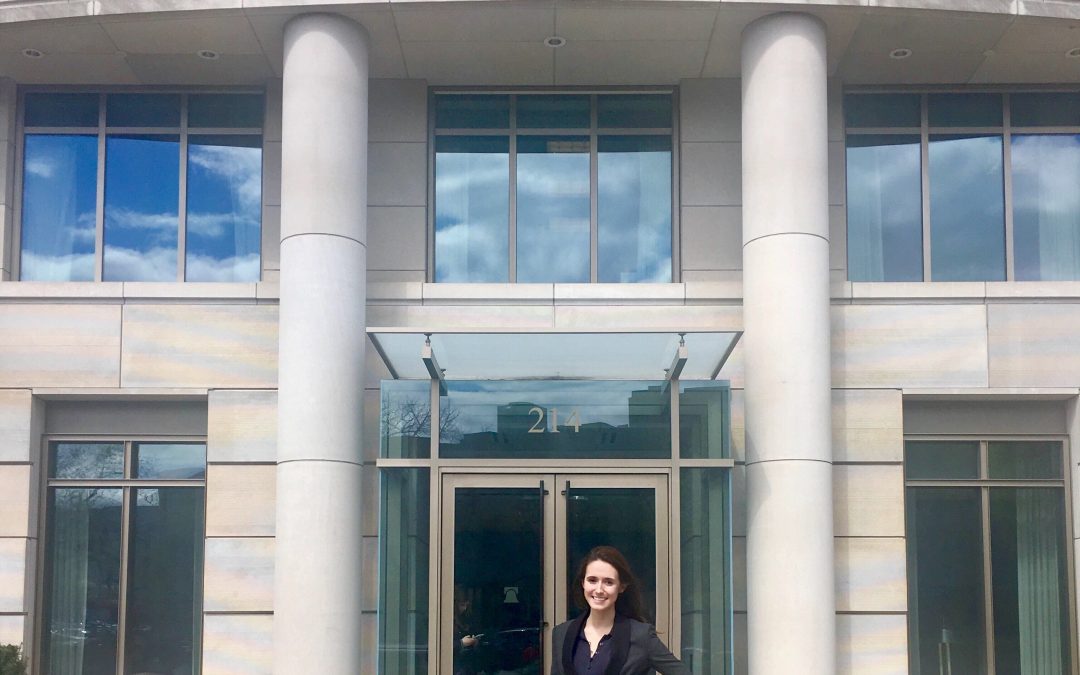
by Madison McHugh | Jun 18, 2018 | Internship Experiences, Undergraduate Students
My name is Iulia Lupse, and I am studying Diplomacy and International Relations with a minor in Russian and Eastern European studies. I interned in the Media Relations department at the Heritage Foundation in Washington, D.C. I was initially interested because it is the leading conservative think-tank in the United States. I completed extensive research before applying, and when I learned about their Young Leaders Program, I was hooked. The program offered skill development briefings, policy briefings, and first principle lunches. In the skill development briefings, we learned valuable skills to navigating Washington D.C., such as public speaking, networking, and resume building. In the policy briefings, interns were informed on numerous subjects such as defense, foreign policy, healthcare, education, and more. The First Principles Lunches were my personal favorite as we participated in discussions about the founding principles, the conservative movement, and the philosophy behind conservatism.
While my interests lie in national security and defense, the skills I learned in the Media Department are useful for a wide-range of jobs. My main responsibilities included logging print hits, writing press pitches, keeping the Heritage Press and Heritage website up-to-date, and compiling media lists. On less busy days, I attended Heritage events and others around the city, allowing me many networking opportunities. Initially, I found that my greatest challenge was public speaking and networking, because I tended to be shy in conversation – however, I overcame this fear during my time at Heritage, and it certainly paid off.
The highlight of my internship was attending C-PAC. I had the pleasure of meeting President Kay Cole James, Ivanka Trump, Paul Teller, and Ben Shapiro among many others. I also completed projects with my mentor in the defense department at the Heritage Foundation, including research on the new defense bill and the importance of nuclear deterrence. These experiences were crucial during my time with the Heritage Foundation.
Although I plan to continue my pursuit in intelligence careers, the connections I made and the skills I gained will be valuable in any field I will choose in the future. The Heritage Foundation gave me the opportunity to apply and expand my knowledge and skills. I would highly recommend this internship to others because it provides a wonderful learning experience and networking opportunities. I am ever grateful for what I learned, and I am even more excited to continue learning based on my experiences in D.C.













